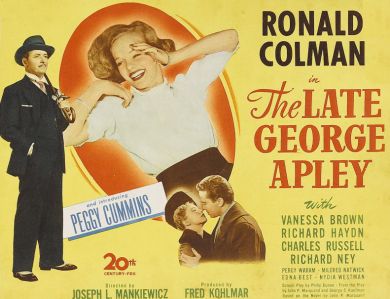
 “The Triumphant Decline of the WASP” reads the title of a provocative recent piece in The NY Times by Noah Feldman, which boldly argues that the now Protestant-less composition of the Supreme Court represents a victory of establishment virtue. And by “establishment,” Feldman is referring specifically to White Anglo Saxon Protestants (WASPs). Needless to say, it’s a tough sell – but also one that hits close to home.
“The Triumphant Decline of the WASP” reads the title of a provocative recent piece in The NY Times by Noah Feldman, which boldly argues that the now Protestant-less composition of the Supreme Court represents a victory of establishment virtue. And by “establishment,” Feldman is referring specifically to White Anglo Saxon Protestants (WASPs). Needless to say, it’s a tough sell – but also one that hits close to home.
I’ve always felt that one of the hallmarks of cultural Protestantism, the picture to the right notwithstanding, is a de-emphasis on ethnic identity markers (a value implicit in the column), not to mention an allergy to public praise in general. Detached from their theological underpinnings, these traits can be a bit self-defeating – so much so that I’m frankly surprised they’re being recognized here. Regardless, I highly doubt the progenitors in question would see their dethronement in such, um, pastel colors. They might instead attribute the downward mobility to the dilution (and virtual inversion) of their values, over generations, via the notorious country club triumvirate of class prerogatives, workaholism and a-religious materialism. Whit Stillman said everything that needs to be said on the subject already in his film Metropolitan, with equal affection yet considerably less naivete than Feldman. First-hand knowledge doesn’t hurt either.
Fully acknowledging the supremely shaky ground we’re on here, not to mention the irony of endorsing anything resembling a meritocracy, there is, perhaps, a small element of Reformation pride to the diminishment, however unconscious it may have been. And while it might be a tad immature for the post-mortem (at least if Mbird has anything to say about it!), it nevertheless represents an opportunity to connect the dots when it comes to egalitarianism, maybe even to draw some inspiration from the lingering scent of Gospel-inspired liberty. Of course, if it’s all a load of nonsense, it’s still nice to have Protestantism associated with culture for once, as opposed to the profound lack of it. So here’s to ribbon belts, shabby chic and the oh-so-tasteful pursuit of self-preservation.
Satisfaction with our national progress should not make us forget its authors: the very Protestant elite that founded and long dominated our nation’s institutions of higher education and government, including the Supreme Court. Unlike almost every other dominant ethnic, racial or religious group in world history, white Protestants have ceded their socioeconomic power by hewing voluntarily to the values of merit and inclusion, values now shared broadly by Americans of different backgrounds. The decline of the Protestant elite is actually its greatest triumph.
When discussing the white elite that exercised such disproportionate power in American history, we are talking about a subgroup, mostly of English or Scots-Irish origin, whose ancestors came to this land in the 17th and 18th centuries. Their forebears fought the American Revolution and wrote the Constitution, embedding in it a distinctive set of beliefs of Protestant origin, including inalienable rights and the separation of church and state.
Education was probably more important to the way the Protestant elite defined itself, which is why the opening of the great American universities has had such an epochal effect in changing the demographics of American elites. Another key source was the ideal of fair play, imported from the ideology of the English public schools, but practiced far more widely in the United States than in the class-ridden mother country.
Together, these social beliefs in equality undercut the impulse toward exclusive privilege that every successful group indulges on occasion. A handful of exceptions for admission to societies, clubs and colleges — trivial in and of themselves — helped break down barriers more broadly. This was not just a case of an elite looking outside itself for rejuvenation: the inclusiveness of the last 50 years has been the product of sincerely held ideals put into action.
The spread of Ivy League style is therefore not a frivolous matter. Today the wearing of the tweed is not anachronism or assimilation, but a mark of respect for the distinctive ethnic group that opened its doors to all — an accomplishment that must be remembered, acknowledged and emulated.
[youtube=http://www.youtube.com/watch?v=-CwnfathXhU&w=600]

COMMENTS
14 responses to “The Incredible Shrinking WASP”
Leave a Reply














I noticed this part too:
"Why did the Protestant elite open its institutions to all comers? The answer can be traced in large part to the anti-aristocratic ideals of the Constitution, which banned titles of nobility and thus encouraged success based on merit."
Wow, this is a MUCH different narrative of history than what is popularly held. Instead of seeing social change as the product of the indomitable spirit of the oppressed, Feldman sees such change as rooted in the ideals of the bourgeoisie.
I think this is true.
There is a little, possibly, too, of the self-destruct button being pressed.
But it's been being pressed for a long time.
I recommend "Morning Noon and Night", Cozzens fictionalized memoir from 1968, which puts the whole phenomenon on a Canaletto canvass, as one for the ages.
.
One other thought:
It is easier to say things in a eulogy
than when the departed is still alive.
Sometimes I wish this kind of praise and call for emulation had been offered earlier.
Guys,
Far be it from me to say this is a load of hooey, but………
Over the past 30 years wages in this country for the Middle and Working class have remained stagnant, while they have increased exponentially for the upper 5-10 percent. The Protestant elite "opened" its doors to all comers so it could consolidate it capital gains and continue to accumulate capital.
mich–you are obviously a member of the ungrateful masses who have been the unworthy beneficiaries of this sacrificial class/ethnic grace — such magnanimity should give rise to gratitude, not this incessant carping for more, more, more… 😉
I read a great illustration of this phenomenon somewhere (cannot remember where) a number of years ago. The author was making a point about the disconnect between wealthy eastern seaboard types and those who had 'just got it'.
Annnnyaway, two men were at a charity fundraiser, and they began to speak about aircraft. Let's call the men Sumner and Zach, respectively. Sumner mentions that he still likes to clock a few hours on his plane now and then, and Zach mentions that he purchased his first aircraft a few years ago. Zach goes out of his way to mention to Sumner that he purchased a Lear jet, 'brand new, of course.' With an enormous grin on his face, he asks,'And what do you fly, Sumner?'…'Oh, just a little Piper', says Sumner. There is an awkward pause, as both men realize they are living in entirely different worlds.
Sumner's family had been fortunate enough to pass on a little money in trust for several generations, yet Zach's bank account is far healthier. For Zach, the Lear was a trump card, his discussion of aircraft was about mentioning his status symbol and displaying the fact that he had amassed far greater wealth than Sumner would ever see in his lifetime. However, for Sumner, the discussion had just been about the joy of flying airplanes.
In other words, contentedness does not know quite what to do with unbridled ambition…so it just allows it to make its own way.
The funny thing, though, is that the rarity of a piece that would dare mention something positive about a WASP. That rarity is noteworthy.
If the mainstream of opinions about WASPS tend towards more negative, one wonders if WASPS will continue to be "on the way out" far into the future and will reassume some of the hardships that made them travel to America in the first place.
Well, I don't think "preppy" is a very useful term.
I mean, it might be descriptive for someone who is still in school or college, but it's ridiculous to refer to a man in his 70s, like Ralph Lauren, as a preppy.
And none of the other terms people use — WASP, P.L.U., etc. – are of much use either.
And that's why I prefer the term "U.H.B." It's an acronym for Urban Haute Bourgeoisie.
I'd like to add a postscript to the fourth comment:
John Milton was skeptical of certain Italian encomiums he received for his Latin verse. He regarded their fulsome praise as insincere, given the political and religious realities of his day. Thus Milton wrote that his Italian commenders spoke "non tam de se, quam supra se". Which is to say, and this is Milton's translation, they spoke "not so much about him, as over him" (even over him in the sense of a catafalque).
I am put off by the 'posthumous' feel of the Times piece. It's easy to say nice things now, when nothing 'hangs' on it any longer.
Let's not forget that these gestures were not made without considerable social pressure, while preserving intact, as legacy positions attest, for those at the top, the principle of proles sequitur sortem paternam.
Men will always have some weakness of self-congratulation. On the other hand–if you're a Christian, and you actually believe that Christ's work spreads and leavens human history such that heaven comes down to earth rather than earth getting swatted out of the sky and everyone raptured–then you can only assume these types of historical developments are inevitable to some extent. A postmillenial outlook will always look for shadows of human progress in such things. A hell-in-handbasket premillenial, or communist outlook, will always mock and deride every such thing as pure regress.
It is a rare thing for a country to be founded on a principle beyond power and acquisition, and even rarer for the underlying ideal to be the freedom that comes from a personal relationship to God through Christ, available to all people. It took tremendous courage to form a government and society based on this freedom, because it meant knowing for sure that everyone, including the descendants of the founders, will be sure to botch it up, or take advantage, look for loopholes, etc. And it meant knowing that freedom is going to mean rejection of the founders' descendants and often of Christ Himself. It took the courage that comes from trusting that the Lord will provide.
It is inevitable that the same people who put these principles in place, and their descendants, should fail over and over to live up to their ideals. And inevitable that their faults are eagerly watched for and derided. Inevitable, and also tragic. The amazing thing is that the ideals have held this long; in the national consciousness there is, at least for the moment, still a dimly burning wick of trust in the Lord's provision and a sense that freedom is from and for God.